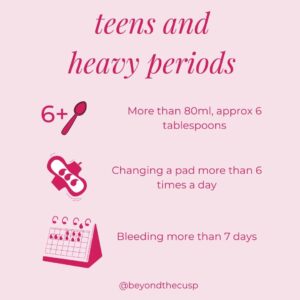
Heavy periods are quite a common part of girls periods in the first few years. Many mothers think that this will be ongoing, but for the most part it is temporary. There is a valid reason for this, and also a way we can help our girls through this stage.
When we first get our period it can take a few years for the brain and the ovaries to develop the pathways to communicate. Many of the cycles in the first few years are anovulatory (meaning we don’t ovulate). Because we are not ovulating, we are not producing progesterone. One of progesterones job is to thin the lining of the uterus. Without progesterone, estrogen continues to thicken the lining, resulting in heavy periods. The same thing happens as we near menopause and we again are not ovulating every cycle.
It’s important to note what constitutes a heavy period.

There are things we can do to help with the heavy periods until cycles become regular ovulatory cycles.
1 – Eat cruciferous vegetables (these pick up excess estrogens and move them through the body)
2 – Avoiding sugar, dairy and processed foods. These make the liver work harder and means oestrogen is not being detoxed as it should
3 – Drinking filtered water. Tap water contains xenoestrogens which mimic our own body’s oestrogen, increasing oestrogen even more
4 – Make sure they are not constipated, daily bowel motions eliminate excess estrogen
Get into the habit of cycle tracking. That way, if things aren’t as they should be for more than a few cycles, and you’ve supported her body with the things above, you can go to a practitioner fully armed with these vital signs to see if there is anything else at play. She can do that either in an app, like Clue, Flo or in the health function if she has an apple product, or just good old pen and paper.
Important things to note include:
– Number of days she is bleeding
– Number of days she is bleeding
– How many times she changes a period product each day, and what the period product is
– Changes in period colour
– Any pain and how that was managed.
For heavier periods, she may be more comfortable using period underwear, or possibly even menstrual cups. These products hold more blood than disposable pads or tampons, so she will not need to change them as much.
Suggested brands include:
Our body is always talking to us, and our period does a great job of telling us what is up. If things don’t seem right, never leave it too long before seeking help from a practitioner specialising in womens hormones.
